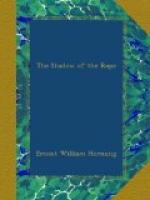Yes, analytical as he was, there at least he was satisfied with himself. Thank God, he had always been of one opinion on that one point; that he had made up his mind about her long before he knew the whilom Mrs. Minchin in the flesh, and had let her know which way almost as long before the secret of her identity could possibly have dawned upon him. Now, if the worst came to the worst, his sincerity at least could not be questioned. Others might pretend, others again be unconsciously prejudiced in favor of their friend; he at least was above either suspicion. Had he not argued her case with Mrs. Venables at the time, and had he not told her so on the very evening that they met?
Certainly Langholm felt in a strong position, if ever the worst came to the worst; it illustrated a little weakness, however, that he himself foresaw no such immediate eventuality. There had been a very brief encounter between two persons at a garden-party, and a yet more brief confusion upon either side. Of all this there existed but half-a-dozen witnesses, at the outside, and Langholm did not credit the other five with his own trained insight and powers of observation; he furthermore reflected that those others, even if as close observers as himself, could not possibly have put two and two together as he had done. And this was sound; but Langholm had a fatal knack of overlooking the lady whom he had taken in to dinner at Upthorpe Hall, and scarcely noticed at Hornby Manor. Cocksure as he himself was of the significance of that which he had seen with his own eyes, the observer flattered himself that he was the only real one present; remembered the special knowledge which he had to assist his vision; and relied properly enough upon the silence of Sir Baldwin Gibson.
The greater the secret, however, the more piquant the situation for one who was in it; and there were moments of a sleepless night in which Langholm found nothing new to regret. But he was in a quandary none the less. He could scarcely meet Mrs. Steel again without a word about the prospective story, which they had so often discussed together, and upon which he was at last free to embark; nor could he touch upon that theme without disclosing the new knowledge which would burn him until he did. Charles Langholm and Rachel Steel had two or three qualities in common: an utter inability to pretend was one, if you do not happen to think it a defect.
As a rule when he had finished a rapid bit of writing, Langholm sat down to correct, and a depressing task his spent brain always found it; but for once he let it beat him altogether. After a morning’s tussle with one unfortunate chapter, the desperate author sent off the rest in their sins, and rode his bicycle to abolish thought. But that mild pastime fell lamentably short of its usual efficacy. It was not one of his heroines who was worrying the novelist, but a real woman whom he liked and her husband whom he did not. The husband it was who had finished matters by entering the field of speculation during the morning’s work. It may he confessed that Langholm had not by any means disliked him the year before.




